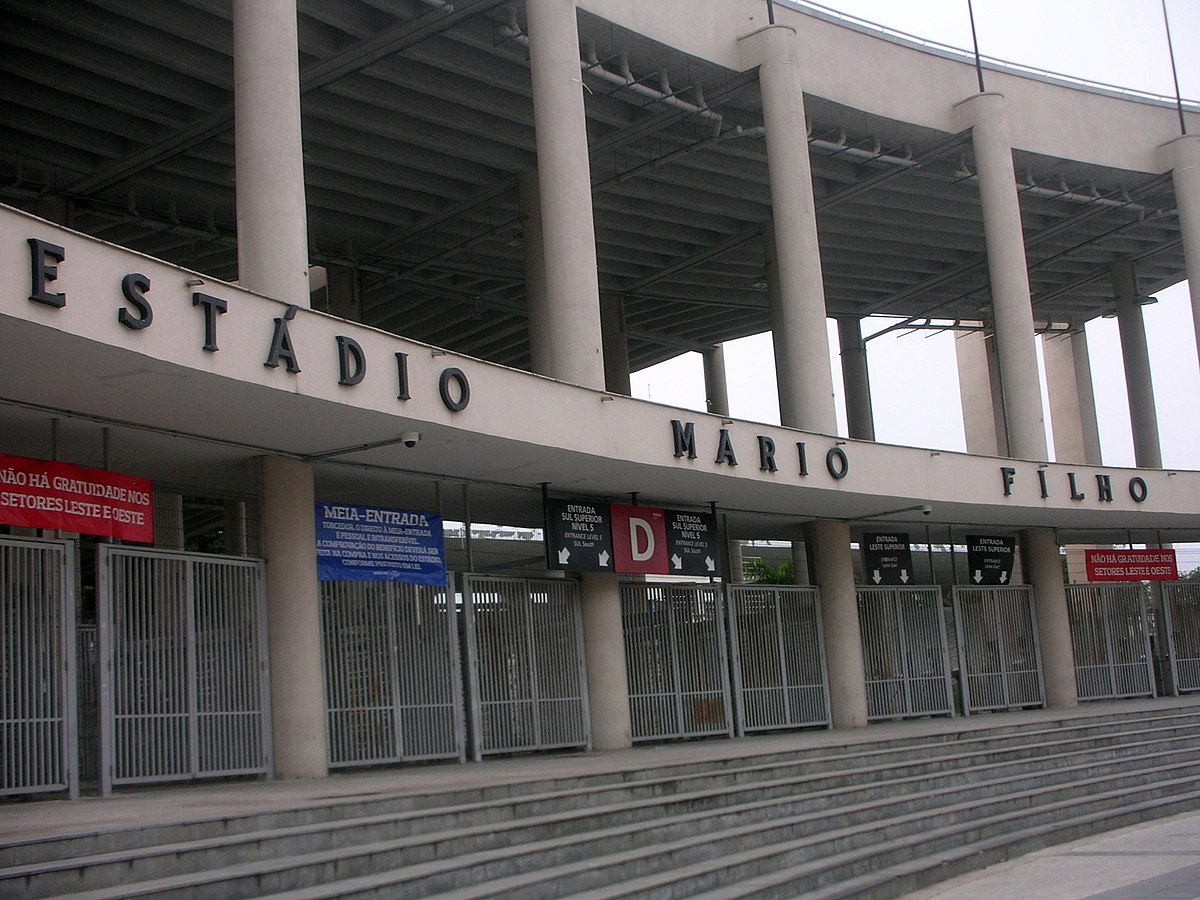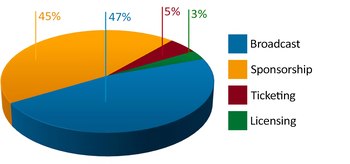Deep Dissection: Are the Olympic Games Financially Viable?
The Olympic Games 122 Years After Their Conception
October 15, 2018
It’s nightfall, and the stadium is crowded with 200,000 people from 206 countries to celebrate their nations’ best rising young athletes. The Buenos Aires Obelisk is at first illuminated by a girl scaling down the building, Argentinian flag in hand, while the national anthem is sung by a chorus in the crowd. Then, the Obelisk is transformed into a speed skating track with several actors racing up the gigantic 235 foot building to cheers from the crowd. After several performances, the Olympic torch is lit, bright with the traditions passed on from every game to the next. This is the start of the 2018 Buenos Aires Youth Olympic Games.
It’s a very different story now for a previous Olympic Games holder, Rio de Janeiro.

The iconic Maracanã Stadium has become empty since the 2016 Rio Summer Olympic Games.
After the conclusion of the Summer Games in 2016, venues are now empty, their hollow arena’s now ringing with dead silence rather than the cries of athletes living out their Olympic Dreams just two years prior. The Maria Lenk Aquatics Centre lays drained, even the famed Maracana Stadium has been deteriorating after being neglected.
An article by Business Insider better illustrated some of the depressing scenes. What’s even more astounding is that these photos within that article were taken only after six months of the Games being held.
The plan was for the venues to be utilized as training facilities for the top athletes of Brazil and for some of them to be repurposed for the betterment of the citizens of Rio, but obviously, that isn’t the case now.
“Rio’s new mayor, Marcelo Crivella, has scrapped plans to turn the handball arena into four public schools. And the 31 towers that made up the athletes village, which were set to be transformed into luxury condos, now sit largely vacant.” -(an ESPN article reported)
Part of this is due to the deteriorating conditions and corruption in Brazilian politics leading up to the Games, but other countries with more stable conditions leading up to the games have had their venues suffer the same fate. What was supposed to be a long term plan for the economy to be boosted by a significant influx of spectators, sponsors, and business only ended up lasting as long as the flames of the Olympic Torch at the Closing Ceremony.
With the 2018 Buenos Aires Youth Olympic Games currently being held in Argentina, and just about any Winter or Summer Olympics occurring every two years, this issue will keep being relevant for the foreseeable future.
Are The Games Financially Viable As Costs Skyrocket?
The Numbers:
To answer this question, there are a variety of angles to consider, one being the International Olympic Committee (IOC), another being individual countries that have hosted the Games, and the final one being the athletes making the Olympics their entire career.
To the IOC, this answer is a resounding yes, but the reasoning behind it may be perplexing. The International Olympic Committee is an organization that interlinks all of the other organizations that help put on the games, such as athlete protections groups, advertising companies, and diplomatic relations between the foreign countries attending the games. The most important linking though is the link between the IOC, advertisers and the National Olympic Committees (NOCs).
So basically, any revenue that goes to the IOC by securing advertisers such as Toyota, Samsung, Visa, etc., is supposed to be distributed to every country’s NOC, which helps fund their athletic development, but a higher percentage of financial support goes out to the NOCs they believe are in greater need of the funding under the program called Olympic Solidarity. The numbers can be laid out as this: 90% of the revenue is given to organizations outside the IOC, with the other 10% going to the administrative costs of the IOC.

The Revenue sources for the IOC are displayed. Notice how almost all factors of the production of the Olympic Games go back to the IOC.

The expenditures with the obtained revenue from the IOC. Most of it goes to the NOCs, but a significant margin still goes to the IOC itself.
Now keep in mind, with soaring costs to produce the Games and the sky-high bids that have to be made to the IOC to choose the host city, 10% is a VERY significant amount, and that’s just considering the bid. That’s not even factoring in the various share of broadcast sponsorships, ticket sales, and host country licensing programs.
Effectively the IOC receives almost everything, with the countries paying for a bid to even have the Olympics hosted in their home city.
The Games are financially viable to the IOC, but that’s not what we’re really asking here. Any company or organization can obtain massive amounts of money through different means, but what are the effects on the cities of holding these Games?
So what then do countries stand to gain financially?
The answers to that are local business and tourists, which can produce some big numbers on their own. “As a result of the Games, the UK is expected to welcome 4 million additional visitors by 2015.” With a GPD increase also expected for 2.7 billion spent by those tourists in the three years after the games, that’s a lofty amount of money expected for tourism after the games were held.
An interesting note by this LONDON 2012 FACTS & FIGURES sheet that some of these financial goals come from, is as follows: “The 2012 Games are expected to create 17,900 additional jobs per year between 2012 and 2015.”
…However, thinking about this from an economic sense, isn’t it London who’s shelling out the money for these games?
Isn’t it them who’s paying for all of these jobs by trying to essentially acquire the International Olympic Committee’s intellectual property (the Olympic Games in this case) in hopes of a sustainable profit from local business?
Don’t be mistaken, all of the jobs created for the construction of the Games themselves were not for the profitability of London itself, but for the IOC officials who own that license to the intellectual property.
The venues being maintained after the games requires significant funding by the city government, and to better cases like LA and London, there is sufficient funding to keep hosting other events that can slowly return them their profits from the buildings that they painstakingly tried to create for a once in century chance event. In other countries that barely had enough money to even put on the Games in the first place such as Rio, the costs of maintaining such buildings proved to be so high that they had no other choice but to cut off power and leave it with no future plans of usage.
In fact, not many cases have turned out positive for the host cities except for Los Angeles, due to the frugality of the partnership and construction of 1984. Since Los Angeles was the only contender in the bidding process for the Games that year, they were able to set the bid low, and another interesting deviation from the norm was that the games were privately funded, not publicly by the government. With these restrictions, they had a limited budget and amassed to make a great profit from not making outlandish plans, but by modifying current LA architecture.
LA has since repurposed many of the (already repurposed for the 1984 Summer Games) venues back into publicly used buildings, such as the Los Angeles Memorial Coliseum, and University of Southern California dorms were actually the Olympic Village for those games.
While LA is the *example of the Olympic Games done RIGHT in terms of economics*, in 2020 and beyond, the trend of lofty budgets and countries actually surpassing those lofty budgets will only worsen.
Case in point: Japan and the Tokyo 2020 Summer Olympic Games.
What started as a bid in 2013 and a financial expectation for $7.3 billion has already soared to almost $25 billion, a 340% increase on an already exorbitant budget. In the end, this cannot work out well even despite the flourishing market of Japan, as anything that high coming from public funds will take a very long time to break even. For example, the 1976 Summer Games left Montreal with $1.5 Billion in debt, which they did not fully pay off until 2006.
So in the end, cities stand to lose more than they can gain, unless if they can be frugal like LA was in 1984, but how is this reflected from the athletes point of view?
After all, Olympians need to pay their bills, so is their job as a full time trainer secure and stable enough?
Well…… Not exactly. Cyrus Hostetler (Olympic javelin thrower) apparently has never made more than $3,000 dollars a year. And a notable example of a dream coming into a clash with modern day reality is that Olympic Gymnast Gabby Douglas’s mother filed for bankruptcy before the 2012 London Olympic Summer Games.
Unless if you’re Michael Phelps with his crazy popularity or Lebron James with his already “baller” lifestyle from the NBA, the Olympic Games cost so much to try to compete in that the additional amount of work to just break even in their lives and pay for their training can certainly paint your favorite athletes credit: in a different light.
We’re not even discussing Olympic hopefuls here, who may not have even made it onto the team, but who have still been paying the high cost of training to become the next great Olympian.
It should be noted here that I discussed US Olympians here. Remember up there where I said that the LA 1984 Games were funded privately, and not by the Government? That also still applies to athletes.
Some athletes get funding from National Associations, like USA Swimming, but that is limited in capacity, as the only ones who will see the benefit are the ones ranking top 16 of all of their competing athletes.
Each country does it’s funding differently, but one common thread seems to appear for almost all of them: if you win gold, you will earn additional bonuses to cover training and some other life costs.
This puts a whole new spin on “Go for Gold” because it really becomes their livelihood if they earn that gold. Otherwise, it’s just a very expensive gamble that didn’t pay off, and it’s just an uphill battle to train for the next Olympic Games.
The one fact that links this all back to the IOC, “IOC members get paid more to watch the Olympics ($7,650 USD for 2.5 weeks of work) than most athletes will make competing in the games.”
Stings a little doesn’t it, that the Committee members end up earning more than the stars that have truly sacrificed livelihood and limb?
So in the end, who really benefits here?
Are the Games really viable to anyone else other than the IOC?
- Countries suffer the overblown budgets of putting these events on in addition an exorbitant cost of the intellectual property.
- Most of the Stadiums after use will just sit to rust and decay, shattering false hopes and promises that the Games would be the end-all be-all to jumpstart the economy.
- The athletes themselves struggle to get by despite achieving the status as best in the world.
Despite the Olympics uniting all of us nations to common ideals and to support our fellow people who have the fire and determination to keep pushing themselves to the world stage, there are significant problems with the production of the Olympics that can simply not be ignored.
*Update: (1/7/19, 5:33pm) Updated Title to Fit in with Deep Dissection Series








